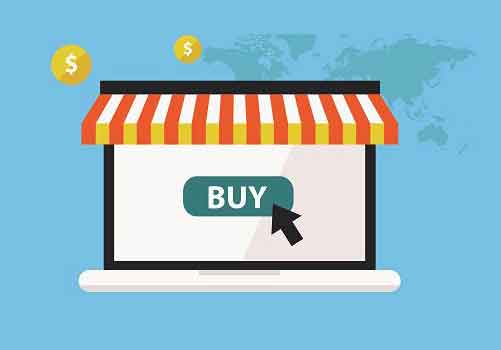Is Selling on Marketplaces for You
One of the strategies proposed in this course is selling on marketplaces.
E-commerce is a type of business strategy that offers a lot of potential for people who are tech-savvy and love using the internet in the process of reaching online users. In our course on E-commerce, you can explore all those potentials of using the Internet to sell online. One of the strategies proposed in this course is selling on marketplaces.

E-commerce is a type of business strategy that offers a lot of potential for people who are tech-savvy and love using the internet in the process of reaching online users. In our course on E-commerce, you can explore all those potentials of using the Internet to sell online. One of the strategies proposed in this course is selling on marketplaces.
The course starts with an introduction of what marketplaces are and it also lays out the process of selling along with its benefits. But you still need to think about whether selling on marketplaces is the right strategy for you. To make such a decision, you should ask yourself a couple of questions. Here are 5 question to help you determine if selling on marketplaces is right for you.


https://unsplash.com/photos/rymh7EZPqRs
Do you sell or resell?
Defining your selling strategy is the starting point which directly affects where you will be selling your products. So think about the product(s) that you are going to sell. Is this a product of your own? Are you the only one selling this product? In case you are reselling, you need to explore the current offer. For example, someone else might already have a very successful online shop, which means that organic reach in your own shop might be a challenge. Then explore how this product is presented on marketplaces. Can you do better? How can you compete with the people selling the same or similar products? Have in mind that online marketplaces have both sellers and resellers. You can apply in either case, but you need to be aware of the people you’re competing against. In general, people who resell products are most likely to do so through online marketplaces, because they require little to no investment and/or involvement (as you will see later in this article). On the other hand, if you’re selling your own product and you want to work on branding, selling on marketplaces might not be such a good idea.Do you have an online presence?
To be able to sell online, you will need a website or a blog. Perhaps you will need an online shop, and most often social networks. A mailing list can also be helpful as well as powerful influence in the online communities. Here are a few tips to help you understand the online presence and how it affects developing your business: How To Create A Big Online Presence For Your Small Business.Try answering these questions
Do you have any of the assets that make up your online presence? Do you have a blog, website, social media channels? How would you assess your current influence? Do you have a presence that can help you place the products on the market and sell them? At this point, it doesn’t matter whether you’re selling your own products or reselling. The only thing that’s important is whether you have an audience to promote this product to. This is an important aspect when making a decision where to sell. In reality, if you have these assets and you’re confident that they would enable you to reach your goals in terms of sales, you might not really need to start selling on marketplaces. Even though marketplaces offer a lot of benefits, if you already have a platform with significant reach, if you already have the audience (i.e., potential customers), you might be better off on your own. One of the most significant benefits of marketplaces is the fact that these websites help you reach the audience you would hardly be able to reach on your own. For someone who is only starting out, an online marketplace might just be an ideal stepping stone. With no audience and no online presence, you can really gain that instant boost through an online marketplace, whereas an established business or brand would not need this.Do you run strategies that might clash with selling on marketplaces?
Selling on marketplaces is one of the strategies you can use to promote your products online. Besides your products, you can resell as well. However, this is the only strategy. You might be running other campaigns as well, which might clash. Here is an example. You want to work on positioning your website. You dive into that whole SEO thing and how to make your product appear at the top of the search result page for the relevant terms. If you decide to feature this product, usually with the same title, on marketplaces as well, here’s the problem you might soon be facing. The marketplace will take over. When it comes to organic search engine results, the product featured on a marketplace will appear above your own website for the relevant search query. After all, both your website and the marketplace page that you create to promote the product contain similar or even identical information. In most cases, the marketplace page will rank better than the product page on your website, simply because it has greater link authority and better page rank. These are metrics that search engines see as valuable in determining how to rank pages. As a result, it might become very difficult to compete against a website with high authority, especially when it comes to sites such as Amazon, eBay and similar. Therefore, if your long-term goal is to position your own website, and you want to work on SEO, think carefully if you want to sell on online marketplaces and create competing links for yourself. To find more about SEO and how it affects search engine visibility, here’s an interesting read: Free SEO Course.How much of involvement do you want?
Here is another aspect that greatly influences the decision of whether or not to sell on online marketplaces. Some people do not want to be much involved in sales strategy, online promotion, and all those stuff. For example, if your products are handmade, and you want to focus all your efforts on creating the best quality product, you might prefer not to be too much involved in the online promotion. Or you might be lacking skill and more in-depth understanding of online marketing to fully leverage its power. Either way, this means that you are probably a type of manufacturer that would enjoy selling through marketplaces.Selling on marketplaces
When you first start selling on online marketplaces, all you actually need to do is to create an account, add your products, optimize those pages and provide as many details as possible to the online buyers. And that is pretty much it. You don’t handle online promotion, you don’t handle payments, website management, and development, etc. Not to mention the fact that you don’t actually worry about getting buyers. Most marketplaces already have a significant base of users, subscribers, and social media followers. This means that you already have a certain audience you will reach, as long as your product matches their search query. Responsibilities you will have, should you decide to go for selling through marketplaces is accepting and completing the orders. Online marketplaces usually offer some kind of grading and ranking system that enables the outstanding sellers to stand from the rest. In case you want to focus on selling on online marketplaces, this would be another aspect that requires your involvement – providing great customer service and maintaining an excellent relationship with your customers. This will help you build up your reputation and reach more people.Having a webshop
On the other hand, having your own website or webshop does require more involvement. From setting up the product pages to managing the website and handling email inquiries, this will probably turn into a full-time job. This is something you need to be prepared for as it directly affects your decision on how you want to advertise and sell your products. If this selling activity is only a part-time job, and you have another job, maybe less involvement is a better solution for you. But if you want to devote to e-commerce and developing different online marketing strategies to help you grow your business, then selling on your own is probably the way to go. It comes with more flexibility and independence.Are you aware of the costs?
Finally, you need to think about the charges. In most cases, people think how marketplaces take a certain percentage for providing the service, as opposed to selling on your own which is free. Well, this is a bit wrong really, because even if you are selling in your online shop, that isn’t really for free. Let’s analyze the costs here:- Site hosting/domain
- E-commerce extensions, plugins, and other integrations necessary to create an online shop, accept and handle payments, etc.
- Time invested in site management
- Time and budget invested in the online promotion of the products
Think about it this way
How do these costs compare to your (predicted) profit? How profitable it is for you to have your online shop? Will you be able to pay off all the monthly costs and still earn a reasonable income? If your answer is yes, if you see this as profitable then it means it’s worth it and having an online store is a good choice. If, on the other hand, you believe that there is no way to generate that kind of income on your own, and if you believe that running an online store is simply too pricey at this stage of your business then you might be better off using online marketplaces. When selling on online marketplaces, you will have a specific fee to pay, but in most cases, the fee is deducted from your sale revenue. This means that you won’t need to invest anything upfront. Only once the sale is realized and once you have money transferred to your account will the online marketplace deduct its fee. So even if you receive less than your sales price, even though this value is reduced by this fee, when you think about it, this might be ok, because you won’t have any other costs you would otherwise have.Conclusion
When making the decision, try to have in mind all of these questions. Consider both the pros and cons of each method and how this compares to your business. In the end, it all depends on your business, what you sell and how you want to sell. E-commerce is a fast-growing industry with figures increasing year by years. Have in mind these three statistics about shopping online.- 67% of Millennials and 56% of Gen Xers prefer to shop on online rather than in-store
- 80% of Americans shop online at least monthly
- 55% of all e-commerce sales are done through branded stores, vs. 45% via marketplaces
